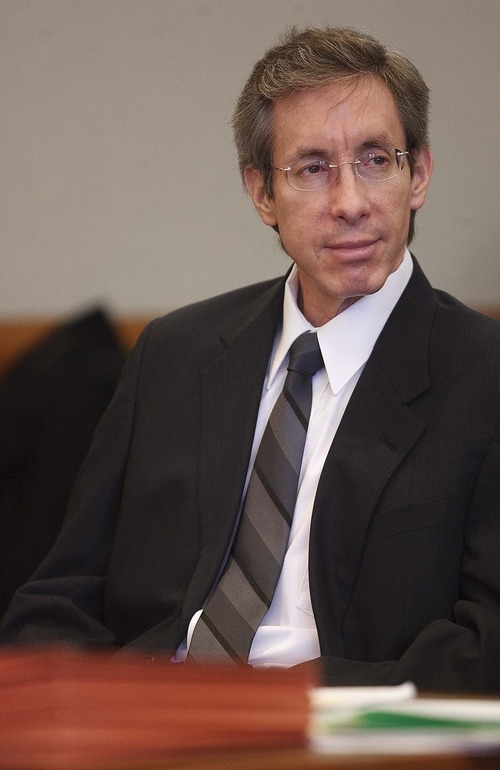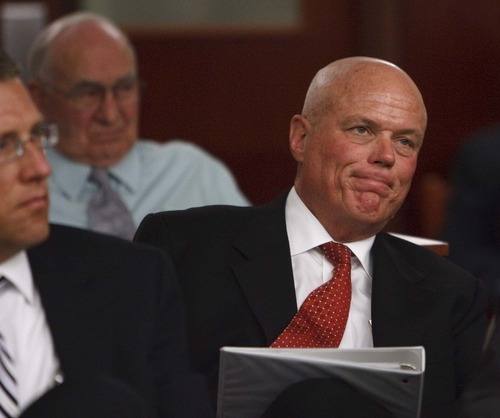This is an archived article that was published on sltrib.com in 2011, and information in the article may be outdated. It is provided only for personal research purposes and may not be reprinted.
In a decision that could have major implications on a long-running court battle, a federal judge ruled Thursday that the state of Utah violated the Constitution when it took over a polygamous sect's property trust nearly six years ago.
U.S. District Judge Dee Benson's decision is a victory for the Fundamentalist Church of Jesus Christ of Latter Days Saints. Its leader, Warren S. Jeffs, reinstated his legal control over the church last week from the Texas jail cell where he is awaiting trial on charges of bigamy and sexual assault.
"Virtually from its first step after it decided to reform the trust, the state court was in forbidden territory," Benson wrote. "The defendants speak at long length about how bad — even criminal — Warren Jeffs' behavior was, but they say little that is relevant to defend their own wholesale interference with an established church."
While state attorneys appeared to argue that the $110 million trust was supporting Jeffs' criminal acts, that wasn't the case officials made for taking it over in 2005 — and it hasn't been proven in court, Benson wrote. The church's property was inextricably tied to its religion, and the state's attempt to pull the two apart was a violation of the separation between church and state, he decided.
"It's a really great day for constitutional rights," said FLDS attorney Rod Parker, who represented 6,000 members of the church in the case. "It takes a lot of courage on the part of judge to say, 'OK, I know this group is out of favor, but this isn't right.' "
In the short term, the decision grants a preliminary injunction blocking the sale of the 700-acre Berry Knoll Farm, considered sacred by the church. The long-term future of the trust, however, wasn't immediately clear. A separate order will define the "precise extent" of the injunction, Benson wrote, though no hearings or deadlines were immediately set.
Attorneys for the state will likely appeal.
"We strongly disagree with Judge Benson's ruling, and now we're going to look at our options, including an appeal," said Paul Murphy, spokesman for the Utah Attorney General's Office. Officials will consider their next move in a meeting next week.
Valued at $110 million, the trust contains nearly all the property in the group's home base in the twin towns of Hildale, Utah, and Colorado City, Ariz., along with its settlement in Canada.
Called the United Effort Plan, the trust was created in 1942 to fulfill the fundamentalist Mormon principle of communally holding property.
Before the state takeover, it suffused nearly all aspects of life for the church's approximately 10,000 members. Their homes belonged to the trust, they worked in trust fields, factories and dairies, and the food they ate came from the trust, Benson wrote. All decisions were made by church leaders based on FLDS principles such as commitment to the faith.
The 2005 state takeover was virtually unprecedented, Benson wrote.
"The defendants cite no case that is even suggested to be remotely similar enough to the instant case to support their defense. This is because there isn't one," he wrote.
The Attorney General's Office made the move after FLDS trustees failed to respond to lawsuits filed in 2004 by former members seeking damages for abuse they suffered under Jeffs. The plaintiffs included a nephew who said Jeffs and other uncles sexually assaulted him as a child and six "lost boys," young men who said they were forced to leave the community to reduce the competition for wives.
State officials said they feared people could lose their homes if those plaintiffs were awarded hefty sums in damages. The trust was structured so that if it failed, ownership reverted to Jeffs, who, in 2006, was charged with rape as an accomplice for presiding over the marriage between an unwilling 14-year-old girl and her cousin. His conviction was later overturned.
Third District Judge Denise Lindberg decidedto reform the trust. She tried to avoid running afoul of the separation of church and state by removing religion from the trust itself. But for the FLDS, religion and property were so intertwined that any action was unconstitutional, Benson said.
"One may as well attempt to make Deuteronomy secular, or the Koran, or to eliminate football from the Super Bowl," he wrote. The only option the court had was revoking the trust — but that might have meant it reverted to Jeffs.
Instead, the court appointed accountant Bruce Wisan to run the trust.He began the process of separating the homes into subdivisions and giving back property to excommunicated members. At first, no FLDS members protested the decision or responded to repeated efforts to involve them in the case. Jeffs apparently ordered his followers to "answer them nothing" and disdained the land on the Utah-Arizona border in favor of a compound built in Texas, Benson wrote.
But the members no longer donated their time, labor and money to the trust. They stopped paying property taxes. With little money coming in and fees mounting, the trust fell into debt.
Then, in 2008, the same year Texas authorities raided Yearning for Zion Ranch, "Jeffs apparently had a change of opinion," Benson wrote. When Wisan proposed selling Berry Knoll Farm, the FLDS entered the legal fray.
A cascade of court hearings in St. George, Salt Lake City and Kingman, Ariz., followed. When the state court denied their petition to intervene in the case, the FLDS filed a federal lawsuit in 2008. Benson decided then to wait and let it play out in state court.
With additional legal costs adding to the financial woes, the trust fell more than $3 million in debt by August 2009. Conflicts over who had rights to farms, homes and the church cemetery proliferated. Utah Attorney General Mark Shurtleff admitted the situation was a "mess."
The church won delays of the Berry Knoll Farm sale, but it lost in Utah Supreme Court, which unanimously ruled last year that members had waited too long to challenge the takeover and restructuring. In October, FLDS attorneys revived the federal suit. Benson granted their request for a temporary restraining order.
"It is one thing for a state to tell a church and its members that they, just like all other residents of the state, may not smoke peyote, or commit child sexual abuse, or violate any other law of general application," Benson wrote. "But it is quite another thing, altogether, to reorganize the religious activities of such churches and their members to make them conform to the states' version of appropriate secular behavior."
But Wisan's partner, W. Val Oveson, said he has been "preserving property and protecting the homes for families living on the UEP property ... for the last six years. Clearly, the federal court is directly at odds with all five members of the Utah Supreme Court. We will continue to do our best to administer the trust while an even higher court resolves this dispute."





